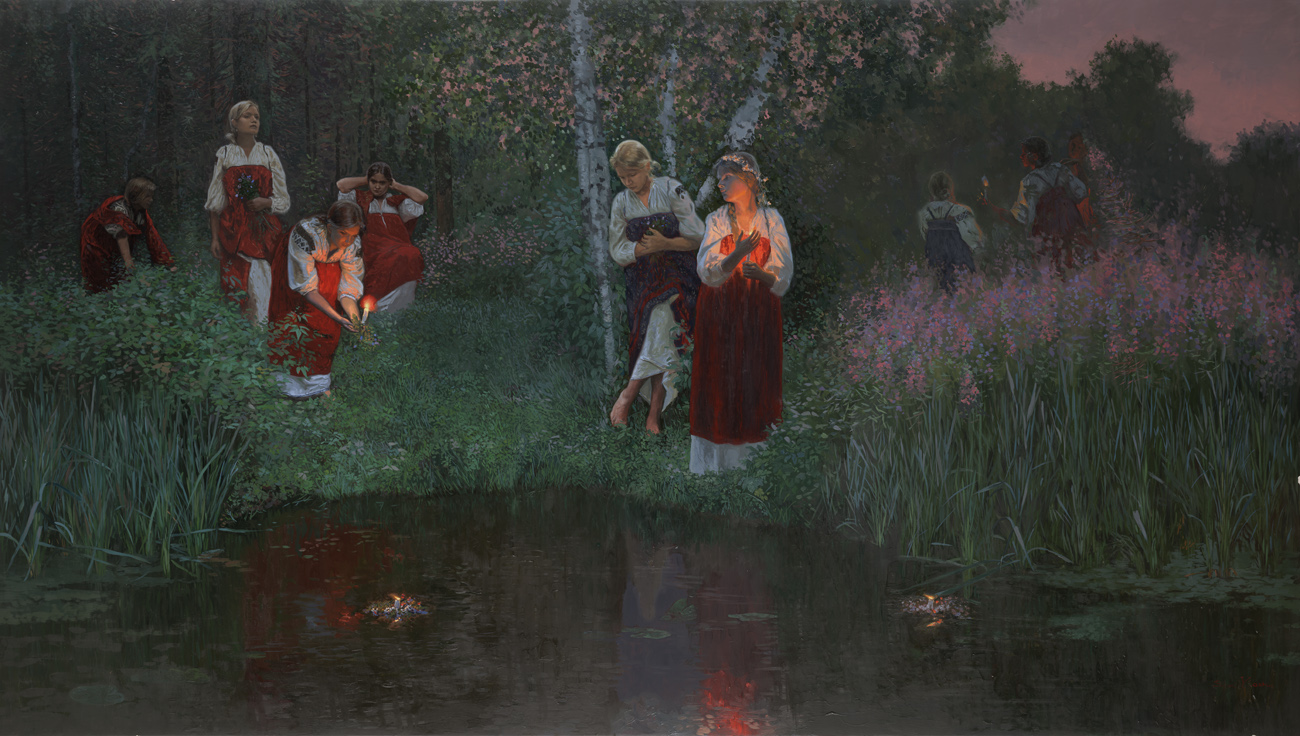 |
| Kupala Night by Siomon Kozhin |
Summer Solstice festival as we know it: it is linked to paganism and bonfires, and dances. It was celebrated once all over Europe in very similar forms. Slavs, Celts and Germanic people treated it as a sacred time where fire and water meets. Some remnants of the festival I still remember from my childhood and teenage years, but it was more a social event with flower wreaths floating,candle light, bonfire, and and wild jumping over fire, this was was left from the days of old, then after all, who doesn't like a good bonfire? Summer Solstice was renamed as Night of the John the Baptist, as the ritual of bathing in the lake of rivers was so important, in Slavic countries, Greece and Balkans this was very important rite.Name Kupala was supposed to be derived form old Slavic word for bathing, bu tit might be even come from Proto-Slavic word kup, which meant comming together. I am not so familiar how it was on British Isles and other countries, if this was a more solar and less lunar festival, more bonfires, or immersion in natural waters was also important.
The movie is kind of nicely done, romanticized, in reality this festival of fire, water, purification, love and fertility was wouldn't be so acceptable by today's standards: animal sacrifice was practiced, etc. The church was trying to eradicate it, as a pagan festival, also certain behavior was considered indecent, people kindled big fonefires also in the cities, etc. and during for ex. XIIIc among Polish peasantry the importance of this festival was diminishing, even as it was practiced. But than during the Renaissance, when the idea that close relation with nature is important, combined with Renaissance in Poland ideas about the myth of Arcadia, also gave more persmision to this pagan festival, solar in nature. All fire in all houses was put out, people congregated close to water, and ritualistically rekindled a new fire. They also bathed in the lake, or river, it was believed that the water had healing powers.
Before that day bathing was allowed only during the night. It was a day of purification, all negativity was believed to be cleansed by bathing, or by jumping over fire. As it was also a festival of love and fertility, a couple who jumped over fire was considered married in old pagan law. Young unmarried women also made wreaths of flowers and were wearing them on their heads, to put them on a piece of wood with candle in the middle, floated them over the waters of lakes, or rivers. And young men were bringing them back, if they caught one dancing with the owner of a garland they caught. It was like today's carnival, and crazy things happen during carnivals. In general this was not only one day, an end of day of celebrations.
Magic was in the air, as this was believed to be a special time, so many ideas about what was supposed to be magic or healing, I could bore you if I would list it. Did you hear about the magic flower? It was supposed to be flowering fern,(which never blooms, by the way), one a year this day, only for short time, but the flower was beautiful, radiating light, and the person who picked it was able to find a hidden treasure. Finding the flower wasn't easy, as it was hidden in the depths of the dark forest,(solar mythology again) but there was a lot of scary forest spirits and dangerous entities who could frighten the candidates for wealth. The problem was not with real danger, but with human capacity to get terribly scarred. Those who had stiff upper lip were more likely to find it, as the legend goes.
Here is a clip about celebrations in Russia, people were trying to recreate more of old flavor, but don't worry, no animals harmed or even present, some kisses and shows of male prowess (wrestling, in my country was jumping over fire), and lots of fun.
On Monday, finally the story about holy Grail in Bezlawki. Brother of Lithuanian ruler according to the legend got it from those who escaped Britain after the battle of Hasting, among them were children of Harold Godwinson. It is just a legend, but the fact is that Gytha of Wessex, together with her brothers escaped to Denmark, and she later married the Vladimoir Monomakh
Who was not a Lithuanian Duke, but close. Stay tuned.